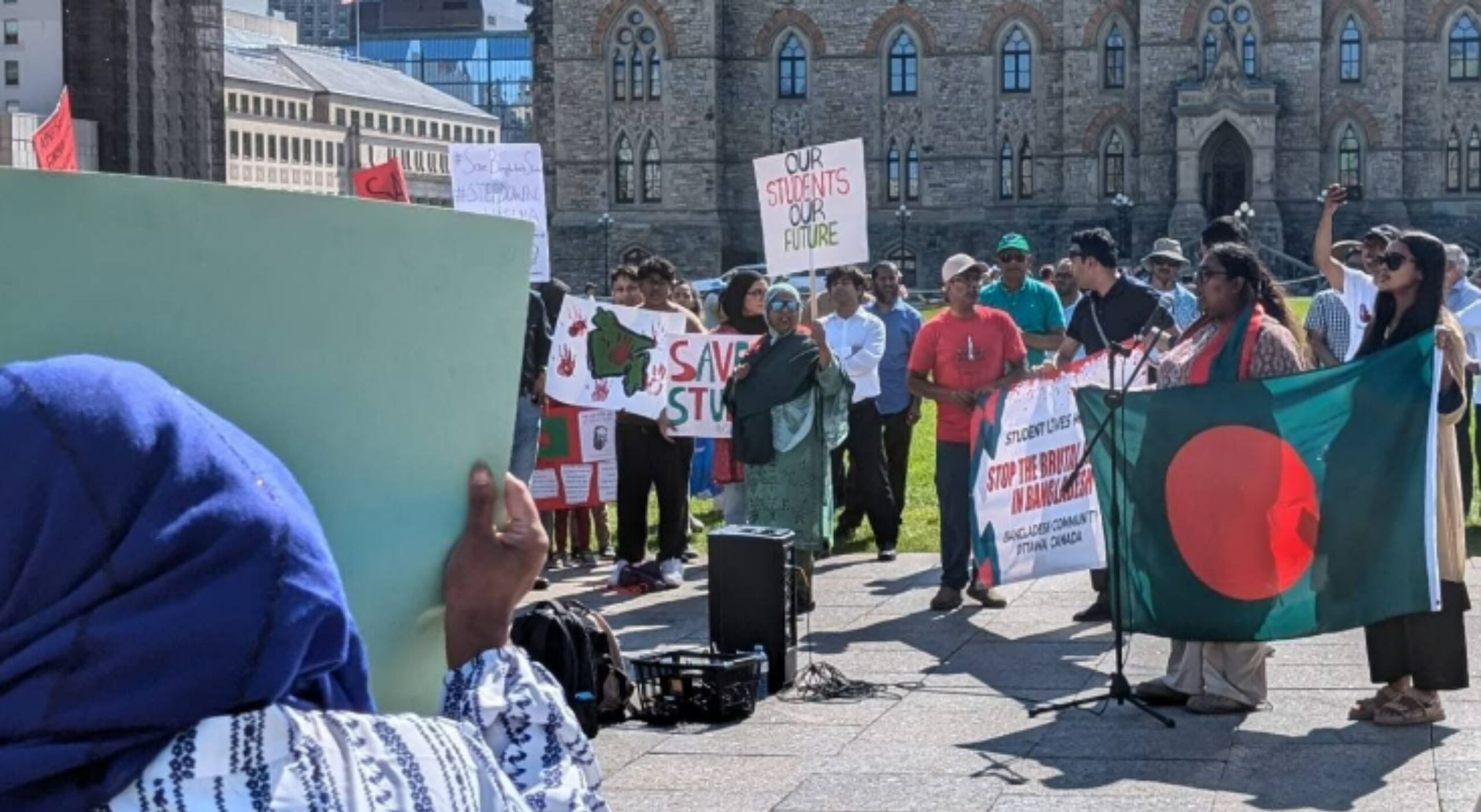change begins with us right here on campus
Bangladesh is a place where the population outgrows opportunities; success isn’t just achieved — it’s fought against the odds of poverty and corruption.
The students of Bangladesh, facing the weight of poverty and corruption, have proven that resilience can thrive even in the harshest conditions. The resignation of Sheikh Hasina, a dictator who ruled Bangladesh with an iron fist for 15 years, marks more than just a political shift —it is a testament to the power of collective action and the unbreakable spirit of a generation that refused to be silenced.
The streets of Bangladesh, once stained with the blood of protesters, now echo with victory chants of students who spoke up against the injustice. These student-led protests are a powerful example of how organized and passionate activism can create meaningful political change, offering inspiration to youth movements not just in Bangladesh, but around the world.
Imagine a classroom full of students like us, each desk stacked with books and dreams. Among them was twenty-five-year-old Abu Sayed, a farmer’s son and one of nine siblings. He earned a scholarship to one of Bangladesh’s top universities, hoping to secure a government job that would lift his family out of poverty.
However, his dreams were crushed when the government reinstated a quota system, giving an astonishing 30 percent of these jobs to the descendants of the “freedom fighters” from the 1971 liberation war from Pakistan. This system, favoring nepotism over merit, revealed the deep corruption that plagued the nation. It was this injustice in the education system that sparked the Students Against Discrimination movement.
Facing the harsh prospect of joining 18 million unemployed youth, Sayed became the figurehead in the “Students Against Discrimination” movement, fighting for fairer job opportunities. During a protest, he stood fearlessly in front of the police, arms outstretched, and was shot dead. The video of his brutal murder spread quickly online, sparking nationwide outrage. Thousands of students, along with educators, lawyers, and everyday people, took to the streets, mourning Sayed and over 200 others who were massacred at the hands of an authoritarian leader.
Their sacrifices forced a change in the quota system, reducing reserved positions to seven percent. However, even this significant change was not enough to end the unrest. The movement had grown into more than a fight for fair job opportunities — it became a movement of the brave, patriotic students of Bangladesh, who took to the streets of the capital to eradicate the systematic corruption that had engulfed the nation.
The youth of Bangladesh had witnessed enough. They grew up watching their nation’s prosperity come at the cost of their freedoms, with their voices increasingly silenced by an authoritarian government. With no alternatives left, the Student League of Bangladesh decided to stand up and fight.
And fight they did. For five long weeks, they marched, protested, and bled, confronting the oppressive regime head-on. Their protests weren’t just loud; they were also well-organized. The students crafted compelling slogans and banners that captured their demands for transparency, accountability, and a return to democratic values. Their chants and speeches, filled with passion, reflected their hope for a better future. They were not just protesting a regime; they were advocating for a vision of Bangladesh where every citizen has equal opportunities.
What started as small gatherings soon became large-scale demonstrations, as students from universities, colleges, and even high schools came together. Fueled by a sense of injustice and a fervent desire for change, they organized rallies, sit-ins, and marches. The students’ effective use of social media, spreading their message far and wide and capturing national and international attention, turned their protest into a significant movement, showcasing the power of modern communication tools in activism.
One of the most compelling aspects of these protests was the students’ unwavering determination. Despite facing tear gas, water cannons, and arrests, they remained resilient. Their bravery in confronting oppression, highlighting the power of youth activism, is a testament to their commitment to their cause. They endured immense pain and loss, but their focus never shifted from their goal: restoring democracy in Bangladesh and creating a nation they could genuinely be proud of—free from oppression and injustice.
Their perseverance paid off. Sheikh Hasina, faced with an unstoppable wave of resistance, fled the country. The people of Bangladesh, led by their courageous youth, had toppled a dictator.
But this revolution wasn’t just about tearing down the old; it was about building something new. And who better to lead this change than Dr. Muhammad Yunus, a man who has spent his life lifting the poor and giving power to the powerless? He understood that real progress is not measured by GDP but by the dignity of every citizen, and the students saw in him the embodiment of their hopes: a leader. By choosing Dr. Yunus, they made it clear that the principles of peace, justice, and equality will guide Bangladesh’s future.
Dr. Muhammad Yunus, the Nobel Peace Prize-winning pioneer of microcredit, is on his way to become the head of the interim government. His career has always focused on helping those in need, and with the country rallying behind him, this moment is more than just about picking a new leader. It’s about rethinking what leadership means in Bangladesh and believing that real change is possible.
As Dr. Muhammad Yunus leads the interim government student advisors Nahid Islam and Asif Mahmud highlight a historic moment: the first time students have been appointed to such high-level government roles. Islam, a sociology masters student at Dhaka University, focuses on protecting religious minorities and addressing recent attacks on Hindu communities, promoting inclusivity and security.
Mahmud, a linguistics masters student also at Dhaka University, brings innovative economic ideas and leadership experience to develop reforms aligned with Yunus’s vision of social entrepreneurship. Their involvement emphasizes how youth-led movements can drive a significant change and inspire global progress.
For us, the students at the University of Ottawa, the story of Bangladesh’s student protests is both inspiring and empowering. It shows just how much impact a united and passionate group of students can have on the world. As we pursue our own academic and personal goals, the bravery of these Bangladeshi students reminds us of our potential to make a difference.
Their movement highlights the importance of standing up for what we believe in and fighting for positive change. It challenges us to think about how we can contribute to our communities and engage with issues that matter. Whether through activism, advocacy, or simply raising awareness, we all have the power to create meaningful change.
Our own experience here at the University of Ottawa echoes this spirit. When students rallied to push for ethical investments, it demonstrated our commitment to social justice and willingness to take a stand on global issues. This local activism mirrors the global impact of the Bangladeshi students, showing that change begins with us right here on campus.
As we reflect on their journey, we should embrace their message of hope and resilience. Their example should motivate us to use our voices to stand up for justice and equality. The students of Bangladesh have demonstrated that change becomes possible when people unite with a shared vision for a better future. They have proven that loving one’s country entails working to improve it, not just accepting its flaws. Their courage sets a powerful example, reminding us that democracy is not guaranteed—it must be fought for and protected.
In the end, this movement is about more than political change; it’s about the power of unity and collective action. The students of Bangladesh have shown that when people unite with love for their country and a desire for justice, they can achieve the impossible. They’ve chosen a new path, a new leader, and a new future, reminding the world that the true power of a nation lies not in its rulers but in its people.





